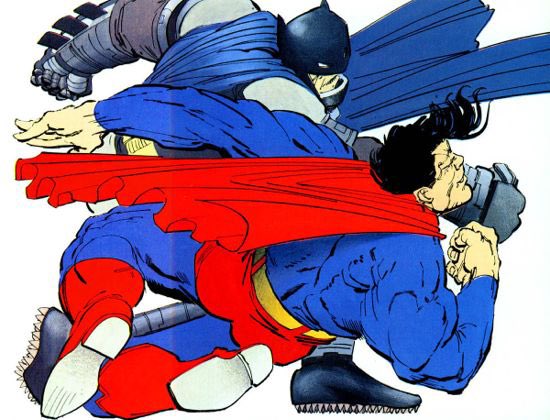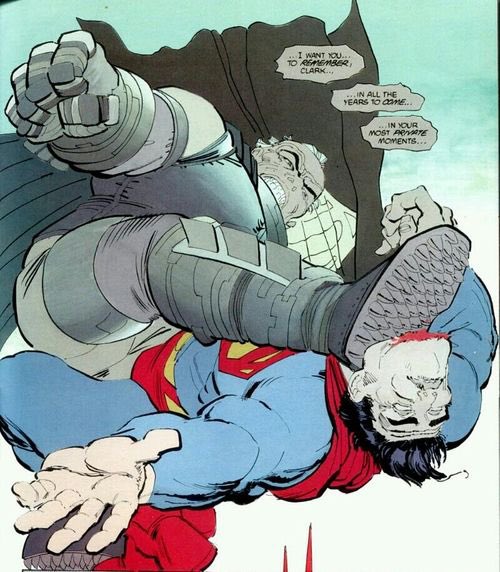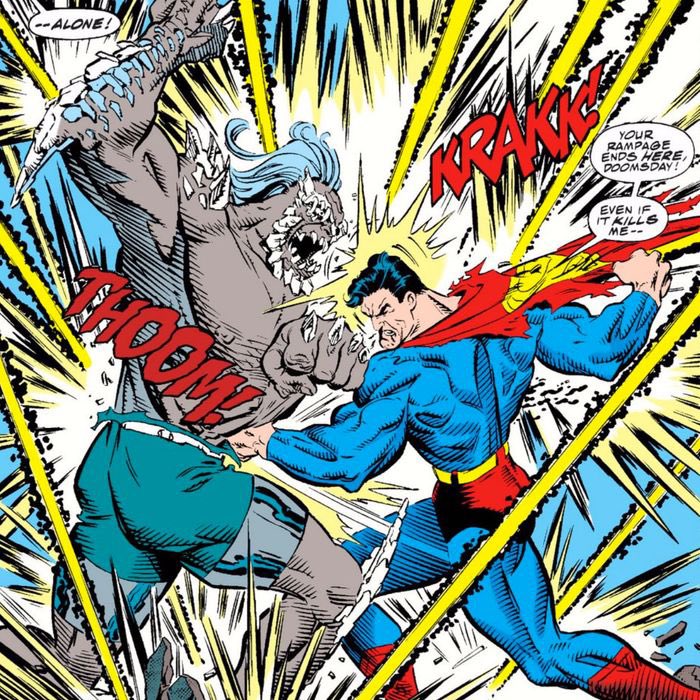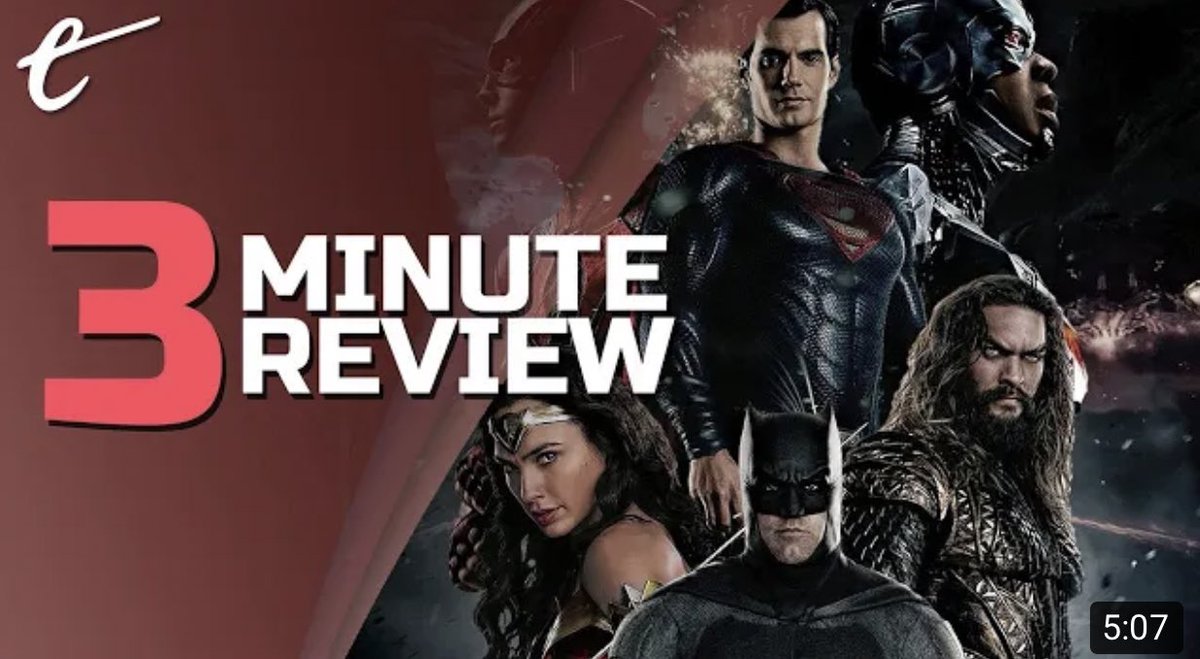
"Floyd, step up to the door."
One of the most interesting things about "Suicide Squad" is the weird middle-ground that it occupies in terms of production.
It's a Marvel-style IP-driven project, but it was clearly designed as a Warner Bros. talent-drive production.
One of the most interesting things about "Suicide Squad" is the weird middle-ground that it occupies in terms of production.
It's a Marvel-style IP-driven project, but it was clearly designed as a Warner Bros. talent-drive production.
In that it's notable for re-teaming the talent that worked together on the quirky (and largely forgotten) con artist movie "Focus" from the previous year, Margot Robbie and Will Smith.
The idea is to put them both in a comic book movie, and hope that it'll work.
The idea is to put them both in a comic book movie, and hope that it'll work.
"Focus" was not a great film, and the reviews were underwhelming. But I remember that at the time, that sort of star-driven vehicle seemed like an increasing rarity in the current system.
And "Suicide Squad" is an attempt to port that star-driven movie-making to superheroes.
And "Suicide Squad" is an attempt to port that star-driven movie-making to superheroes.
There's a tangible sense that Will Smith is one of the last proper movie stars standing, and struggling with what to do in this new cinematic climate.
Smith's projects tend to be star-driven. Sometimes that works (as genie in "Aladdin") and sometimes it doesn't ("Gemini Man").
Smith's projects tend to be star-driven. Sometimes that works (as genie in "Aladdin") and sometimes it doesn't ("Gemini Man").
Warner Bros. were traditionally seen as one of the most old-fashioned studios in Hollywood, generally trusting talent.
Hell, you can see that in the way they put together the DCEU: Nolan as producer, Snyder as director, Affleck as Batman. Even here, Leto and Davis.
Hell, you can see that in the way they put together the DCEU: Nolan as producer, Snyder as director, Affleck as Batman. Even here, Leto and Davis.
The problem with "Suicide Squad" is that, after "Batman v. Superman", Warners completely lost faith in that model.
So you end up with the butchery of "Suicide Squad" and "Justice League", where there's a sanding down of a very strong and distinct identity.
Just negation.
So you end up with the butchery of "Suicide Squad" and "Justice League", where there's a sanding down of a very strong and distinct identity.
Just negation.
There's no small irony in the fact that the only person who got out of "Suicide Squad" completely unscathed was... a movie star.
Margot Robbie's Harley Quinn was the movie's breakout character. And while Harley is popular, it's hard to oversell how much of that is Robbie.
Margot Robbie's Harley Quinn was the movie's breakout character. And while Harley is popular, it's hard to oversell how much of that is Robbie.
"You're going to be my friend."
Hugely controversial take here: the obvious and justifiable criticisms of Jared Leto notwithstanding, and thinking the film botches the dynamic with Harley, I don't mind the "sleazy, try-hard gangster" take on the Joker here.
Hugely controversial take here: the obvious and justifiable criticisms of Jared Leto notwithstanding, and thinking the film botches the dynamic with Harley, I don't mind the "sleazy, try-hard gangster" take on the Joker here.
There have been literal decades of self-serious takes on the Clown Prince of Crime, and I've read decades of stories that present him as the most absurdly important figure in these narratives.
And some of them are legitimately great. Ledger's Joker is an all-timer.
And some of them are legitimately great. Ledger's Joker is an all-timer.
After decades of this "baddest ass that ever assed badly" takes on the Joker, there's something to be said for a take on the character that just presents him as a dude who probably has "Scarface" and "Goodfellas" posters framed in his hangout.
The cruminess is kinda appealing.
The cruminess is kinda appealing.
In that Leto's Joker in "Suicide Squad" is arguably the first time since Caesar Romero in "Batman '66" that the Joker hasn't been presented as an unstoppable force of nature, but just a weird dude in clown make-up.
As somebody with severe Joker fatigue, I... don't hate that.
As somebody with severe Joker fatigue, I... don't hate that.
(Incidentally, one of my favourite details of "Batman '66" is that the Joker is generally the least dangerous and threatening of Batman's enemies, especially compared to the Riddler or Penguin.
He just seems to do what he does because he enjoys doing it.)
He just seems to do what he does because he enjoys doing it.)
"What we got here?"
Not that anybody needs this pointed out, but the edit on "Suicide Squad" is... something else entirely.
The film has no real sense of tone, bouncing between the one Ayer made and the one Warners decided they wanted around about March of that year.
Not that anybody needs this pointed out, but the edit on "Suicide Squad" is... something else entirely.
The film has no real sense of tone, bouncing between the one Ayer made and the one Warners decided they wanted around about March of that year.
I think Ayer is fairly hit and miss as a director - I'm not a huge fan of "End of Watch" or "Fury." He's also not as distinct a stylist as, say, Snyder.
But he at least tends to have a better grasp of tone than "Suicide Squad" suggests. He also doesn't make movies like this one.
But he at least tends to have a better grasp of tone than "Suicide Squad" suggests. He also doesn't make movies like this one.
"She takes an average person, a yoga mom, an elderly retiree, and she turns them into a soldier who can take a headshot and still fight. It's an instant army."
Another detail I quite enjoy in a very messy movie: the sense in which the film understands Amanda Waller.
Another detail I quite enjoy in a very messy movie: the sense in which the film understands Amanda Waller.
In its best moments, "Suicide Squad" understands that Waller is far worse than any of the soldiers that she employs.
She's directly responsible for all the terrible things that happen, and she walks away completely free because she's connected.
She's directly responsible for all the terrible things that happen, and she walks away completely free because she's connected.
Waller is another recurring reminder in the DCEU that state power often as horrific as the threats it claims to face, particularly in the context of the War on Terror.
Indeed, Waller explicitly positions her work as an effort to build a state-sanctioned equivalent to Superman.
Indeed, Waller explicitly positions her work as an effort to build a state-sanctioned equivalent to Superman.
There's recurring motif in the DCEU that any attempt to frame superheroes in the context of post-9/11 state power is inherently monstrous, and that superheroes need to transcend that sort of metaphor in order to function.
"So let me guess. We're going to the swirling ring of trash in the sky. You know, 'cause why wouldn't we?"
It's tempting to excuse all the film's issues as rooted in the editting, there fundamental issues with the film's storytelling.
The actual plot is incredibly generic.
It's tempting to excuse all the film's issues as rooted in the editting, there fundamental issues with the film's storytelling.
The actual plot is incredibly generic.
Just structurally, allowing for the edit, "Suicide Squad" is somehow two different but consecutive rescue missions for the same macguffin.
The characters are sent to rescue Waller. They fight monsters, they rescue her. They lose her. They fight monsters, they rescue her again.
The characters are sent to rescue Waller. They fight monsters, they rescue her. They lose her. They fight monsters, they rescue her again.
I get that it's thematically important that the characters are forced to rescue Waller the first time and then make a choice to rescue her the second time.
But it's too generic and repetitive. The monsters are bland. The action (and this is probably the edit) is routine.
But it's too generic and repetitive. The monsters are bland. The action (and this is probably the edit) is routine.
And, to be fair, this problem is *compounded* by the edit. With information held back from the audience, not to maximise impact, but to punctuate action beats.
So the stakes are constantly shifting, but not in a purposeful or insightful way. Just because they are.
So the stakes are constantly shifting, but not in a purposeful or insightful way. Just because they are.
Think of how long it takes the movie to explain what Flagg and Enchantress were doing in Midway City, or how the "big" twist that Waller is "HVT-1" just falls flat.
It's a jumbling up of a fairly linear and conventional narrative that makes its flaws more apparent.
It's a jumbling up of a fairly linear and conventional narrative that makes its flaws more apparent.
"Okay, honey. It's me and you."
This is a problem that is very explicitly down to the edit, at least according to Ayer: "Suicide Squad" seems to genuinely believe that the Joker and Harley Quinn are in love.
Even the all-ages cartoon gets it's an abusive and toxic relationship.
This is a problem that is very explicitly down to the edit, at least according to Ayer: "Suicide Squad" seems to genuinely believe that the Joker and Harley Quinn are in love.
Even the all-ages cartoon gets it's an abusive and toxic relationship.
It's a very weird change to make to the film in the edit and reshoots, one which really failed to read the room in the context of 2016.
This was around the point that various media would actually break-up Harley and Joker. Even Harley gets the relationship is toxic.
This was around the point that various media would actually break-up Harley and Joker. Even Harley gets the relationship is toxic.
To be fair, even outside of comic books, there were reasons why in that stretch from 2015 to 2017 you'd imagine that major studios would be wary of glossing over the horror of an abusive relationship.
Making all of the portrayal of the Harley/Joker dynamic a very strange choice.
Making all of the portrayal of the Harley/Joker dynamic a very strange choice.
"I am your ally. And I know what you want. Exactly what you want."
Something I'd completely forgotten, "Suicide Squad" also contains the third act "nostalgia trap" that ensnares the heroes, like the other DCEU films: "Man of Steel", "Wonder Woman", "Justice League."
Something I'd completely forgotten, "Suicide Squad" also contains the third act "nostalgia trap" that ensnares the heroes, like the other DCEU films: "Man of Steel", "Wonder Woman", "Justice League."
It's interesting that all these four films feature a "temptation" scene in their third acts, with the characters offered lives that they want - often lives that they had and lost.
It's an interesting recurring thematic trend, particularly in the context of fan culture.
It's an interesting recurring thematic trend, particularly in the context of fan culture.
It's perhaps revealing that this rejection of nostalgia is a recurring motif in the modern DC films rather than the modern Marvel films.
Because DC have a much longer and more diverse history. Their characters come with more baggage more high-profile earlier adaptations.
Because DC have a much longer and more diverse history. Their characters come with more baggage more high-profile earlier adaptations.
So while it's not hard for Robert Downey Jr. to be the definitive version of Iron Man, Ben Affleck is competing with Christian Bale, Michael Keaton, Kevin Conroy, Adam West and a few more.
So nostalgia is a more immediate threat to these iterations of the characters.
So nostalgia is a more immediate threat to these iterations of the characters.
Anyway, "Suicide Squad" is still a spectacular mess of a movie with some very interesting bits hanging off.
I would absolutely watch the Ayer Cut were it ever released, even if I get the sense there's more of his movie here than there was of Snyder's movie in "Justice League."
I would absolutely watch the Ayer Cut were it ever released, even if I get the sense there's more of his movie here than there was of Snyder's movie in "Justice League."
• • •
Missing some Tweet in this thread? You can try to
force a refresh








